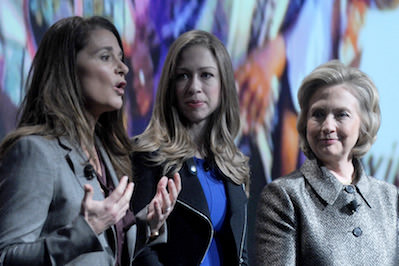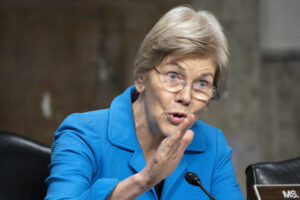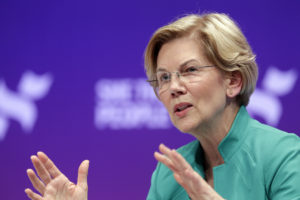Thomas Frank on the Financial Feminism of Clinton Democrats
The historian and arch journalist spent 2015 studying the modern Democratic Party, and his new book, “Listen, Liberal,” is the result An excerpt published exclusively at Harper’s Magazine finds in the career of Hillary Clinton “a performance of liberalism so realistic one could almost believe it lived”.

Melinda Gates, left, Chelsea Clinton and Hillary Clinton onstage at a Clinton Foundation event in Manhattan in March 2015. (Dennis Van Tine / STAR MAX / IPx / AP)
The historian and arch journalist spent 2015 studying the modern Democratic Party. His new book, “Listen, Liberal,” is the result of that effort, and an excerpt published exclusively at Harper’s Magazine finds in the career of Hillary Clinton “a performance of liberalism … so realistic one could almost believe it lived.”
At a Clinton Foundation event held the day after International Women’s Day last March, Frank saw women from the Third World impressed into the efforts of such women as Melinda Gates, actress America Ferrera and Clinton, who were working not explicitly to improve the lives of women at the bottom of the world economy, but to help women in the First World break the “glass ceilings” in their industries.
Onto the stage before us came former secretary of state Clinton, the Democratic Party’s heir apparent; Melinda Gates, the wife of the richest man in the world (the event was produced with the Bill & Melinda Gates Foundation); various NGO executives; a Hollywood celebrity; a Silicon Valley CEO; a best-selling author; an expert in women’s issues from Georgetown University; a Nobel Prize winner; and a large supporting cast of women from the Third World. Everyone strode with polished informality about the stage, reading their lines from an invisible teleprompter. And back and forth, the presenters called out to one another in tones of supportiveness and sweet flattery. …
What this lineup suggested is that there is a kind of naturally occurring solidarity between the millions of women at the bottom of the world’s pyramid and the tiny handful of women at its very top. The hardship those Third World women have endured and the entrepreneurial efforts they have undertaken are powerful symbols of the struggle of American professional women to become CEOs of Fortune 500 companies (one of the ambitions that was discussed in detail) or of a woman to be elected president, which was the unspoken theme of the entire event.
Reviewing Clinton’s tenure as President Obama’s secretary of state, Frank found that she advanced “a version of feminism in which liberation is, in part, a matter of taking out loans from banks in order to become an entrepreneur.”
Clinton’s other great initiative during her State Department days was the so-called Hillary Doctrine: the recasting of the United States as the world’s defender of women and girls. Now, here was a virtue quest of the most principled kind. The single remaining superpower was no longer to be an overbearing hegemon or a bringer of global financial crisis—it was actually determined to improve life for half of the planet’s population. …
Like so many high-minded Democratic virtue quests, this one turned out to be largely concerned with the personal, with foundations and private companies that would partner with the United States to do things like “improve maternal and child health,” “close the global gender gap in cellular-phone ownership,” “persuade men and boys to value their sisters and their daughters,” and “make sure that every girl in the world has a chance to live up to her own dreams and aspirations.”
These aims found a major expression in the adoption and expansion of the practice of microfinance, a “financial innovation that would save the Third World.”
Foundations embraced it. Careers were built on it. Billions were spent advancing it. The United Nations declared 2005 the International Year of Microcredit. Muhammad Yunus, the Bangladeshi economist who popularized microlending, won a Nobel Prize in 2006. Three years later, Barack Obama gave Yunus the Presidential Medal of Freedom.
And it was all so simple. While national leaders busied themselves with the macro-matters of privatizing and deregulating, microloans would bring the science of markets down to the individual. Merely by providing impoverished individuals with a tiny loan of fifty or a hundred dollars, it was thought, you could put them on the road to entrepreneurial self-sufficiency, you could make entire countries prosper, you could bring about economic development itself.
What was most attractive about microlending was what it was not, what it made unnecessary: any sort of collective action by poor people coming together in governments or unions. The international development community now knew that such institutions had no real role in human prosperity. Instead, we were to understand poverty in the familiar terms of entrepreneurship and individual merit, as though the hard work of millions of single, unconnected people—plus cell phones, bank accounts, and a little capital—was what was required to remedy the Third World’s vast problems. Millions of people would sell one another baskets they had made, or coal they had dug out of the trash heap, and suddenly they were entrepreneurs, racing to the top. The key to development was not doing something to limit the grasp of Western banks, in other words; it was extending Western banking methods to encompass every last individual on earth.
Microlending is a perfect expression of Clintonism, since it brings together wealthy financial interests with rhetoric that sounds outrageously idealistic. Microlending permits all manner of networking, posturing, and profit taking among the lenders while doing nothing to change actual power relations—the ultimate win-win.
This is who modern Democrats are, as exemplified by Hillary Clinton, Bill Clinton and Barack Obama, Frank writes: a group of technocrats who outsource the work of improving the lives of the people they are supposed to represent to markets and those who dominate them, and who are thanked and celebrated for it because few people perceive what is actually happening.
This is modern liberalism in action: an unregulated virtue exchange in which representatives of one class of humanity ritually forgive the sins of another class, all of it convened and facilitated by a vast army of well-credentialed American technocrats, while the objects of their high and noble compassion sink slowly back into a preindustrial state.
Read Frank’s full excerpt here.
—Posted by Alexander Reed Kelly.
Independent journalism is under threat and overshadowed by heavily funded mainstream media.
You can help level the playing field. Become a member.
Your tax-deductible contribution keeps us digging beneath the headlines to give you thought-provoking, investigative reporting and analysis that unearths what's really happening- without compromise.
Give today to support our courageous, independent journalists.






You need to be a supporter to comment.
There are currently no responses to this article.
Be the first to respond.